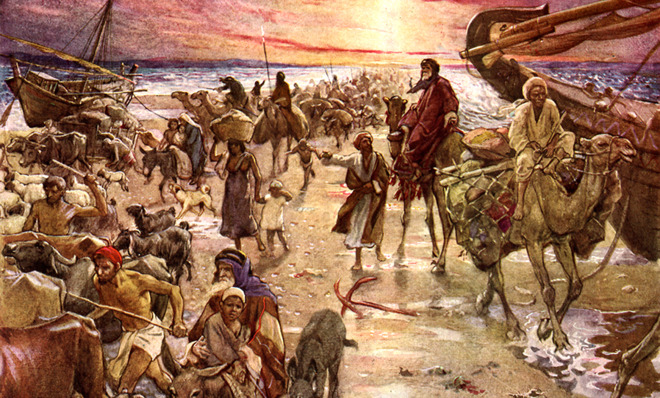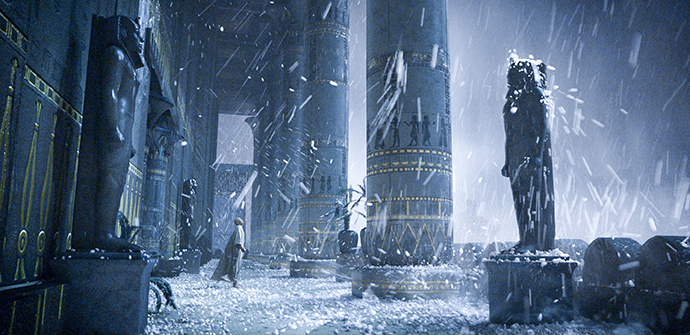Why I believe in miracles
Even when a tremendous event has a scientific explanation, there's plenty of room to see God behind the logic


A free daily email with the biggest news stories of the day – and the best features from TheWeek.com
You are now subscribed
Your newsletter sign-up was successful
Ridley Scott's Exodus: Gods and Kings opens this week, and will apparently cast the parting of the Red Sea as less miraculous than when Chuck Heston's Moses parted the waters in 1956's The Ten Commandments. In Ridley Scott's telling, it wasn't God and Moses that parted the oceans so fleeing Jews could escape an Egyptian army. Instead, the miraculous parting was thanks to a conveniently timed tsunami.
"You can't just do a a giant parting, with walls of water trembling while people ride between them," says Scott, who remembers scoffing at biblical epics from his boyhood like 1956's The Ten Commandments. "I didn't believe it then, when I was just a kid sitting in the third row. I remember that feeling, and thought that I'd better come up with a more scientific or natural explanation." [Entertainment Weekly]
But here's the thing: For true believers, it doesn't really matter. Because even a tsunami could theoretically have God's hand behind it.
For a believer, the notion that God could use the physical laws He set in place to bring about His divine plans makes perfect sense. If anything, "it takes way more faith to believe that, 'oh it just so happened that there was an earthquake that caused the parting of the Red Sea, at just the moment they prayed that they needed to part the [sea],'" than to believe it was a pure coincidence, Eric Metaxas, author of the book Miracles, told me during a recent podcast discussion.
The Week
Escape your echo chamber. Get the facts behind the news, plus analysis from multiple perspectives.

Sign up for The Week's Free Newsletters
From our morning news briefing to a weekly Good News Newsletter, get the best of The Week delivered directly to your inbox.
From our morning news briefing to a weekly Good News Newsletter, get the best of The Week delivered directly to your inbox.
In his new book, Jesus on Trial, author David Limbaugh has a term for this phenomenon, which he attributes to his pastor Ron Watts. It's called a "God-incidence." This phrase has become part of the Christian lexicon in recent years, suggesting there was plenty of demand to justify the term's invention.
During his 2005 commencement speech at Kenyon College, David Foster Wallace did a terrific job of encapsulating this retroactive rationalization, in the form of a parable. As Wallace told it,
There are these two guys sitting together in a bar in the remote Alaskan wilderness. One of the guys is religious, the other is an atheist, and the two are arguing about the existence of God with that special intensity that comes after about the fourth beer. And the atheist says: "Look, it's not like I don't have actual reasons for not believing in God. It's not like I haven't ever experimented with the whole God and prayer thing. Just last month I got caught away from the camp in that terrible blizzard, and I was totally lost and I couldn't see a thing, and it was fifty below, and so I tried it: I fell to my knees in the snow and cried out 'Oh, God, if there is a God, I'm lost in this blizzard, and I'm gonna die if you don't help me.'" And now, in the bar, the religious guy looks at the atheist all puzzled. "Well then you must believe now," he says, "After all, here you are, alive." The atheist just rolls his eyes. "No, man, all that was was a couple Eskimos happened to come wandering by and showed me the way back to camp." [David Foster Wallace's commencement speech at Kenyon College]
Surely, many miracles can be retroactively rationalized. And I suspect that almost all miracles could be explained away as mere coincidence, even if doing so (as Metaxas argues) requires more faith — more tortured twists and turns, more laboring and cherry picking — than simply believing that something supernatural might have occurred.

For instance, once, many years ago, I went out late at night try to start my car and go somewhere (this was at a time in my life when my night didn't begin until, say, 11 pm). If my car had started, I would have backed onto Maryland's Route 17, as I always did when heading south, and I would have been hit by a speeding car. Now, I always backed onto the road, but this was not a problem since you could see for a long distance. Except, on this particular night, seconds after my car didn't start, another car flew by without its headlights on. There is no doubt that something was technically wrong with my car. Had I summoned a mechanic at that instant, he could probably have quantified the reason my ignition failed to start. There would have been a scientific or mechanical reason.
A free daily email with the biggest news stories of the day – and the best features from TheWeek.com
But why did it happen at this very moment when I was in danger? Perhaps it was only a coincidence. But I'd like to think it showed that God intervened, that he has a purpose for me.
Scoff if you will. But you must be able to at least see how a believer can see miracles taking many forms. And that even when an event has a perfectly rational scientific explanation, the devout might see God behind the science.
The simplest explanation is usually the correct one. But there's still room in there for God.
Matt K. Lewis is a contributing editor at TheWeek.com and a senior contributor for The Daily Caller. He has written for outlets including GQ Politics, The Guardian, and Politico, and has been cited or quoted by outlets including New York Magazine, the Washington Post, and The New York Times. Matt co-hosts The DMZ on Bloggingheads.TV, and also hosts his own podcast. In 2011, Business Insider listed him as one of the 50 "Pundits You Need To Pay Attention To Between Now And The Election." And in 2012, the American Conservative Union honored Matt as their CPAC "Blogger of the Year." He currently lives in Alexandria, Va.
-
 Film reviews: ‘Send Help’ and ‘Private Life’
Film reviews: ‘Send Help’ and ‘Private Life’Feature An office doormat is stranded alone with her awful boss and a frazzled therapist turns amateur murder investigator
-
 Movies to watch in February
Movies to watch in Februarythe week recommends Time travelers, multiverse hoppers and an Iraqi parable highlight this month’s offerings during the depths of winter
-
 ICE’s facial scanning is the tip of the surveillance iceberg
ICE’s facial scanning is the tip of the surveillance icebergIN THE SPOTLIGHT Federal troops are increasingly turning to high-tech tracking tools that push the boundaries of personal privacy
